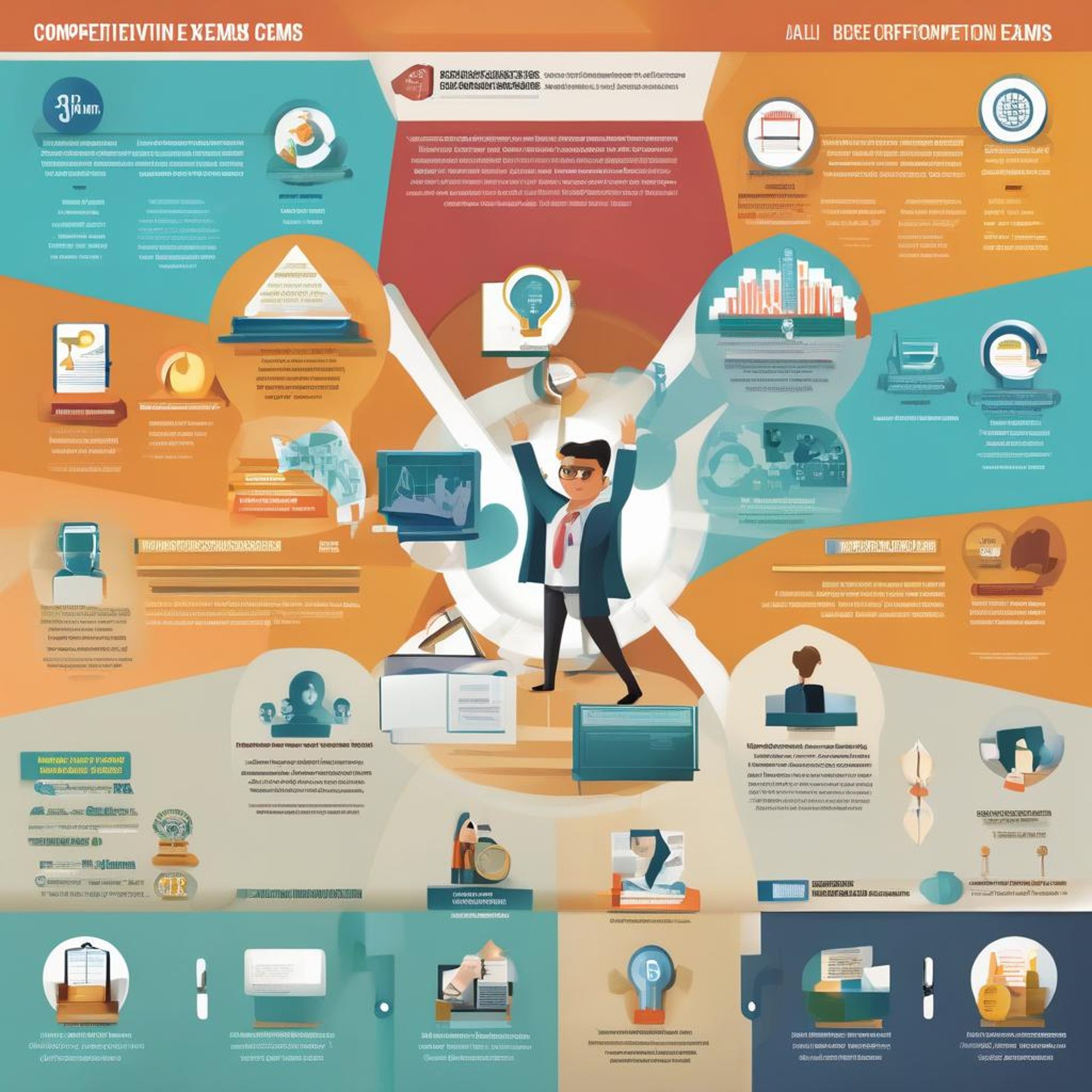I: Introduction
Competitive Exams: A well-structured plan and effective study materials are the keys to success in today's competitive job market. Proper preparation is essential whether you're aiming for a government job, a position in banking, railways, or a competitive exam such as UPSC, SSC, NEET, or IIT-JEE. Let's explore the best study materials.
Lakhs of aspirants attend competitive exams each time, but only a few are selected. To understand this, we should investigate why these individuals were chosen, how they prepared for the examination, how much time they dedicated to it, and which books they used for study. This analysis offers a comprehensive guide to preparing for and effectively participating in competitive exams, ultimately achieving a high ranking.
Your chosen books are the key to success as a student preparing for competitive exams. They will shape the depth of your understanding and the effectiveness of your study. Your role in selecting the right books is crucial and empowering. But why is it so essential to choose the right books? Because it directly impacts the effectiveness of your study, giving you a sense of control and confidence.
There are many books available in the market today. But are all books valuable? How do you know which book is best for which exam? Choosing the right books is crucial because it enables you to manage your time effectively when studying from multiple sources, ensuring you are organised and efficient in your study schedule and covering all necessary topics.
When selecting a book, ensure it thoroughly covers the syllabus in detail. This comprehensive coverage will give you a sense of security and reassure you that you are well-prepared for every aspect of the exam, boosting your confidence.
The material you choose should be easy to understand; books that clearly explain complex topics are great. For instance, "Quantitative Aptitude" by R.S. Aggarwal is renowned for clearly explaining mathematical concepts. Mastering the material in such books will make you feel competent and ready to tackle any question that comes your way.
Books that include past exam questions and mock tests are more valuable as they clearly understand the exam pattern and help you prepare effectively. These resources familiarise you with the questions you'll encounter on the exam and help you manage your time efficiently while evaluating your understanding and knowledge of the subject.
Opting for books by reputable authors ensures high-quality content. For instance, M. Laxmikanth for Indian Polity, Ramesh Singh for Indian Economy, and R.S. Aggarwal for Quantitative Aptitude are trusted names in competitive exam preparation, providing security in your study materials.
If you choose the right books, your studies will be more effective. In this article, I will provide details of the books you must read. The article provides the names of books and authors for your reference. For more detailed information, please refer to the additional resources. Suppose you are serious about preparing for any competitive examination. First, examine all possibilities, then plan which books are good, how to obtain them, and how to prepare. One way to do this is to create a study plan that outlines all these factors before you begin.






II: Comprehensive understanding of the types of competitive exams
There are many types of competitive exams. Some people pursue government jobs, while others take exams to enter fields such as banking, engineering, medicine, and management. Each exam has a distinct syllabus, question pattern, and required reading materials. Now, let's explore the popular competitive exams and their necessary study materials.
1. UPSC (Union Public Service Commission) – Civils, IAS, IPS, IFS
Why should you write it?
The UPSC, or Union Public Service Commission, is the central-level government commission in India. It conducts several key government examinations, including the Civil Services Examination (CSE). To secure the highest-level government jobs in the country, you must take the UPSC exam, which is renowned for being extremely challenging.
Civil Services Examination (CSE)
This examination is to recruit the highest-level officers required by the country. It consists of three main stages:
1. Prelims – Objective type examination
2. Mains – Detailed examination
3. Interview – Personality test
All India Services & Central Services
IAS (Indian Administrative Service) – District Collectors with high positions in government administration.
IPS (Indian Police Service)—These are police department services, including those headed by the DGP, IGP, and SP.
IFS (Indian Foreign Service) – Services in Indian embassies in foreign affairs.
UPSC Civil Services Exam is very prestigious. This systematic study plan requires the right books and consistent practice. If your goal is UPSC, go ahead with discipline, perseverance, and proper guidance!
2. SSC (Staff Selection Commission) – CGL, CHSL, MTS
Why should you write?
The Staff Selection Commission (SSC) is a central agency responsible for filling Group B and C non-gazetted posts in Indian government departments, offices, and other organisations. It conducts various examinations annually to fill positions at multiple levels. These exams are for securing jobs in the central government, such as Income Tax, Excise, Customs, CBI, and Auditor.
SSC Main Exams:
SSC CGL (Combined Graduate Level Exam)
Who is eligible? Candidates who have completed a Bachelor's degree.
The qualified candidates will be hired as Assistant Auditors, Income Tax Inspectors, Sub-Inspectors (CBI), Assistant Section Officers (ASO), etc.
Stages:
Tier 1 – Objective Test
Tier 2 – Mains Exam
Tier 3 – Descriptive Writing
Tier 4 – Skill Test (for some posts only)
SSC CHSL (Combined Higher Secondary Level Exam)
Who is eligible? Candidates who have completed Class 12th.
The qualified candidates will be hired as Lower Division Clerks (LDC), Data Entry Operators (DEO), postal Assistants, etc.
Stages:
Tier 1 – Objective Test
Tier 2 – Descriptive Test
Tier 3 – Skill Test / Typing Test
SSC MTS (Multi Tasking Staff Exam)
Who is eligible? Candidates who have completed 10th class.
You will be hired for Group C non-technical posts, such as Peon, Janitor, Clerk Helper, and Daftari, if you qualify.
Stages:
Paper 1 – CBT (Computer-Based Test)
Paper 2 – Descriptive Test
Importance of SSC Exams
It is an excellent opportunity to secure a central government job through SSC at a relatively low competitive cost. The exam syllabus typically includes General Awareness, General English, Quantitative Aptitude, and Reasoning Ability. The syllabus is less extensive, and the competition is more intense; therefore, systematic preparation and practice of mock tests are crucial.
3. IBPS, SBI, RBI – Bank Job Exams
Why should you write?
The IBPS, SBI, and RBI exams offer crucial opportunities for individuals seeking to secure employment in the banking industry in India. These organisations conduct exams to fill Clerical, PO (Probationary Officer), Specialist Officer (SO), and Grade B positions.
IBPS (Institute of Banking Personnel Selection)
IBPS is an independent organisation that recruits for jobs in public sector banks. By utilising the Institute of Banking Personnel Selection (IBPS), you can obtain job opportunities in over 11 government banks.
IBPS Main Exams:
IBPS PO (Probationary Officer Exam) – Bank Manager level jobs.
IBPS Clerk – Bank clerical jobs.
IBPS RRB (Regional Rural Banks Exam) – Officer and Assistant jobs in rural banks.
IBPS SO (Specialist Officer Exam) – Specialist posts like IT, Marketing, and Law Officer.
IBPS Exam Pattern:
Prelims – Aptitude, Reasoning, English
Mains – General Awareness, Banking Awareness
Interview (PO, SO) – Personality, Banking Knowledge
SBI (State Bank of India)
The State Bank of India (SBI) is the largest government-owned bank in India. It conducts exams and fills vacancies.
SBI Main Exams:
SBI PO (Probationary Officer Exam) – Management level job.
SBI Clerk (Junior Associates Exam) – Cashier, Customer Support jobs.
SBI SO (Specialist Officer Exam) – Jobs in IT, Finance, Law, HR, etc.
SBI Exam Pattern:
Prelims – Objective Questions (Maths, Reasoning, English)
Mains – Banking Awareness, Quantitative Aptitude, General Awareness
Group Discussion & Interview (PO, SO)
SBI is highly competitive, so good preparation is required.
RBI (Reserve Bank of India)
RBI is the heart of the Indian banking system. RBI conducts its recruitment exams independently.
RBI Main Exams:
RBI Grade B Officer Exam – High-level posts related to banking policy & management.
RBI Assistant Exam – Clerical level jobs.
RBI Grade B Exam Pattern:
Phase 1 (Prelims) – Quant, Reasoning, English, General Awareness
Phase 2 (Mains) – Economics, Banking & Finance, Management
Interview – Personality, Banking & Economics Knowledge
RBI exams are highly competitive, so a special focus should be on banking and economics.
Specialities of Bank Jobs
The advantages include job security, a competitive salary, and opportunities for advancement. Additional benefits include medical coverage, allowances, and pensions. Stable and essential jobs in the banking sector
4. RRB (Railway Recruitment Board) – Group D, ALP, NTPC
Why should you write this exam?
The Railway Recruitment Board (RRB) is a government agency responsible for recruiting for various positions within the Indian Railways. Railway jobs are attractive to many candidates due to their stable security, competitive salaries, and additional benefits. You must write this exam for jobs such as Technician, Loco Pilot, Clerk, Ticket Collector, and Goods Guard in the Railways.
RRB Group D (Level-1 Posts)
Who is it for? Candidates who have completed at least 10th class or ITI.
Jobs: Track Maintainer, Helper, Assistant Workman, Gateman, etc.
Stages:
CBT (Computer-Based Test) – General Intelligence, Maths, General Awareness
PET (Physical Efficiency Test) – Physical Efficiency Test
Document Verification & Medical Test
Maintaining physical fitness is essential. In the Physical Efficiency Test (PET), men must cover a distance of a hundred meters in two minutes while carrying a weight of thirty-five kg. Women need to complete the same distance in two minutes but with a weight of 20 kg.
RRB ALP (Assistant Loco Pilot)
Who is eligible? Candidates who have completed ITI, Diploma or Engineering.
Jobs: Assistant Loco Pilot (ALP) – A person who helps drive a railway locomotive (engine).
Stages:
CBT-1 – Aptitude, Reasoning, General Science
CBT-2 – Technical Subjects (Engineering-related questions)
CBAT (Computer-Based Aptitude Test) – Psychometric Test (Vision, Response Test)
Document Verification & Medical Test
This test requires technical knowledge, making it best suited for candidates with an ITI or engineering background.
RRB NTPC (Non-Technical Popular Categories)
Who is eligible? Candidates who have completed the 12th class or degree.
The qualified candidates will be hired as Traffic Assistants, Goods Guards, Commercial Assistants, Station Masters, Senior Clerks, and other roles.
Stages:
CBT-1 – Maths, General Awareness, Reasoning
CBT-2 – Syllabus in more depth
Typing Test (only for some posts)
Document Verification & Medical Test
Station Master and Traffic Assistant posts have shift work. Jobs like Goods Guard have a high possibility of travelling.
Preparation Tips for RRB Exams
Review the question papers released so far. Make a daily routine of reading current affairs and practising Mathematics and reasoning. Maintaining fitness is crucial for RRB Group D and ALP exams.
5. GATE (Graduate Aptitude Test in Engineering)
Why should you write it?
The GATE is a nationwide examination designed for individuals with backgrounds in engineering and science. It is crucial for higher education opportunities, such as M.Tech, M.E., PhD, and job placements in PSUs (Public Sector Units).
Key Features of GATE
Exam Conduction: Jointly conducted by IITs & IISc.
Eligibility: B.Tech / B.E / B.Sc (Engg) / M.Sc / MCA / Final year students in the above courses are also eligible.
Exam Format: Computer Based Test (CBT).
Exam Score: Valid for up to 3 years.
Uses:
Admission to IITs, NITs, IISc for M.Tech / M.E / PhD.
PSU Jobs (IOCL, ONGC, BHEL, HAL, NTPC, GAIL, SAIL)
Opportunities in Indian & Foreign Universities
GATE Exam Pattern
The exam is worth 100 marks and will last 3 hours.
There will be multiple-choice questions (MCQs) and numerical answer-type questions (NATs).
Total 65 questions:
General Aptitude (GA) – 15 marks
Engineering Mathematics – 13-15 marks
Core Subject (Specialisation) – 70-72 marks
Specially conducted for Mechanical, Civil, EE, CSE, ECE, and other 29+ branches.
GATE Preparation Tips
Understand the syllabus well. Write mock tests repeatedly; a Test Series is essential. Practice old question papers. Make a habit of meticulously taking notes. Focus on Math and Practical Application.
6. CAT, XAT, GMAT – Management Entrance Exams
Why to write?
Management entrance tests, such as CAT, XAT, and GMAT, are essential for candidates aspiring to pursue an MBA or PGDM in top business schools (B-Schools) in India. These provide admission opportunities to candidates who score well in renowned management institutes, such as the Indian Institutes of Management (IIMs), XLRI, Indian School of Business (ISB), and international Business Schools.
CAT (Common Admission Test)
Exam Conducted by: IIM (Indian Institutes of Management)
Use: You must gain admission to IIMs, IIT-MBA, FMS, SPJIMR, IMT, and other top management institutes.
Eligibility: Candidates who have completed their degree (UG) with at least 50% marks. (45% for SC/ST/PwD categories)
Exam Format:
Verbal Ability & Reading Comprehension (VARC) – 34 questions
Data Interpretation & Logical Reasoning (DILR) – 32 questions
Quantitative Aptitude (QA) – 34 questions
Total 100 questions | 3 sections | 3 hours of exam
Good CAT score: 99+ percentile for a chance in a top IIM.
It is essential to practice extensively to achieve a good rank in the CAT exam.
XAT (Xavier Aptitude Test)
Exam Conducted by: XLRI, Jamshedpur
Use: Required for admission in XLRI, XIMB, SPJIMR, IMT, TAPMI, and other top B-Schools.
Eligibility: Degree-qualified candidates
Exam Format:
Verbal & Logical Ability
Decision Making (DM) – This is a speciality!
Quantitative Aptitude & Data Interpretation
General Knowledge (GK) – Used in GD/PI
Total 100+ questions - 3 hours test
A special section in the XAT is called "Decision Making." It tests the ability to understand problems and make informed decisions.
GMAT (Graduate Management Admission Test)
Test conducted by (Graduate Management Admission Council)
Use: Required for admission to ISB, XLRI PGDM-GM, and international B-Schools (Harvard, Stanford, Wharton, INSEAD, LBS).
Eligibility: Degree-qualified candidates
Test format:
Analytical Writing Assessment (AWA) – 1 essay
Integrated Reasoning (IR) – 12 questions
Quantitative Aptitude – 31 questions
Verbal reasoning – 36 questions
Total score: 800 marks - 3.5 hours test
GMAT score is valid for 5 years. A score of 700+ can get you into top B-Schools!
Top Management Institutes (B-Schools)
With CAT Score: IIMs, FMS Delhi, SPJIMR, MDI, NITIE
With XAT Score: XLRI, XIMB, TAPMI, Great Lakes
With GMAT Score: ISB Hyderabad, INSEAD, Harvard, Stanford, LBS
Management Exams Preparation Tips
Take daily mock tests. Learn about politics, economics, and market trends. Practice Logical Reasoning and Decision-Making. Time management is crucial—complete over 100 questions in 3 hours!
7. NEET – Medical Entrance Exam
Why to write?
NEET (National Eligibility cum Entrance Test) is a national-level examination conducted in India for admission to MBBS, BDS, BAMS, BHMS, and other medical courses. It is performed by the National Testing Agency (NTA). NEET is crucial for securing admission to medical colleges nationwide, including renowned institutions such as AIIMS and JIPMER.
NEET Key Features
Exam Conductor: NTA (National Testing Agency)
Eligibility: 12th Class PCB (Physics, Chemistry, Biology) with at least 50% marks (GEN), 40% (SC/ST/OBC)
Minimum age 17 years (no upper age limit)
Exam Medium: English, Telugu, 13 languages available
Entrance Opportunities: MBBS, BDS, BAMS, BHMS, BVSc & AH, BNYS, BPT
Direct Entry: AIIMS, JIPMER, AFMC, and other government/private medical colleges
NEET Exam Pattern
Total Questions: 180 out of 200 questions to be attempted
Exam Duration: 3 hours 20 minutes
Questions & Marking:
Physics – 50 (35 + 15) questions (180 marks)
Chemistry – 50 (35 + 15) questions (180 marks)
Biology (Botany + Zoology) – 100 (50 + 50) questions (360 marks)
Total marks: 720
Negative marking: -1 mark for each wrong answer
Scoring 600+ marks in NEET increases your chances of admission to government medical colleges!
NEET Preparation Strategy
Read NCERT books thoroughly – Biology is 100% NCERT-based! You need to prepare formula notes for physics and chemistry. The study plan should be at least 6-8 hours a day. Review the last 10 years question papers. Writing mock tests improves time management.
Career Opportunities After NEET
MBBS – Admission to top government & private medical colleges
BDS – Admission to dental courses
BAMS – Ayurvedic Medicine
BHMS – Homeopathic Medicine
BVSc & AH – Veterinary Science & Animal Husbandry
BPT – Physiotherapy
Rigorous preparation, thorough NCERT coverage, and revision are essential for achieving top marks in the NEET.
8. IIT-JEE (JEE Mains & Advanced) – Engineering Entrance Exam
Why should you appear for it?
IIT-JEE (Joint Entrance Examination) is a national-level entrance exam conducted in India for admission to top engineering colleges (IITs, NITs, IIITs, GFTIs). The process includes two phases: JEE Main and JEE Advanced.
JEE MAINS & ADVANCED Key Features
Exam Conducted by: NTA (JEE Mains) & IITs (JEE Advanced)
Eligibility:
JEE Mains – Class 12 (PCM – Physics, Chemistry, Mathematics)
JEE Advanced – Only the top 250,000 candidates have qualified in JEE Mains successfully.
Exam Medium: English, Telugu and other 13 languages can take the exam
Entry Opportunities:
With JEE Mains score – NITs, IIITs, and other GFTIs
With JEE Advanced score – Renowned institutes like IITs, IISC, RGIPT, IIST
Direct Entry: IITs, NITs, IIITs, GFTIs, IISc, IIST & RGIPT
JEE MAINS Exam Pattern
Exam Mode: Computer-Based Test (CBT)
Total Questions: 90 (Only 75 to be attempted)
Exam Duration: 3 Hours
Questions & Marking:
Physics – 30 questions (100 marks)
Chemistry – 30 questions (100 marks)
Mathematics – 30 questions (100 marks)
Total marks: 300
Negative marking: -1 mark for each wrong answer
If you score 95+ percentile in JEE Mains, you will have a chance in NITs and IIITs.
JEE ADVANCED Exam Pattern
Total questions: 54-60
Exam duration: 3 hours (Paper 1 & Paper 2)
Questions & marking:
Physics, Chemistry, and Mathematics – equal weightage for all three
Multiple Choice Questions (MCQs), Integer Type Questions, Matching Questions
Total marks: Between 360-400
Negative marking: For some questions, the answer is yes, while for others, it's no. Achieving a top rank in JEE Advanced enables you to gain admission to IITs!
JEE Preparation Strategy
Read NCERT books thoroughly – 80% of the questions are on NCERT! Concept clarity is crucial in physics and mathematics. Plan to study for at least 6 to 8 hours a day. Go through the question papers of the last 10-15 years. Writing mock tests improves time management.
Career opportunities after JEE
IITs – Top engineering institutes
NITs, its – Top technical institutes
Private Universities – Universities like BITS Pilani, VIT, SRM, Manipal
Better opportunities in engineering specialisations – AI, Data Science, Robotics, Aerospace Engineering
Rigorous preparation, strong NCERT coverage, and revision are essential to score top in JEE!
The exam pattern, such as timings, marks, and other criteria, may vary from time to time. You should verify and update the official websites of the above competitive exams. The information provided in this article is for reference only.
III: How do you choose the best books?
Many people start reading while preparing for competitive exams. Respect your time and avoid wasting it on books that don't suit your needs. We understand your time is valuable, and it's essential to make the most of it by selecting the right books. The following are a few hints and references to books, authors, and publishers you can review. You should verify all available resources before choosing and purchasing the books or other materials needed for competitive examination preparation.
1. Trusted authors and publishers
It is crucial to select books by the right authors. Books by reputable authors typically feature clear explanations, straightforward language, and comprehensive information. Additionally, quality publishers ensure that their books are error-free. To verify the credibility of the author and publisher, you can check their qualifications, experience, and the reviews of their previous works.
Famous authors:
UPSC & PSC Exams: M. Laxmikanth (Polity), Ramesh Singh (Economy), Bipin Chandra (History)
SSC & Banking: R.S. Aggarwal (Aptitude), Norman Lewis (English)
Engineering & Medical Exams: H.C. Verma (Physics), OP Tandon (Chemistry)
Management Exams (CAT, GMAT): Arun Sharma (Quantitative Aptitude), Nishit Sinha (Logical Reasoning)
Popular publishers include McGraw Hill, Pearson, Arihant, Disha Publications, S. Chand, and Lucent.
More students use books published by these publishers, which have fewer errors and offer clear topic clarity.
2. Books that are in line with the syllabus
Many students start reading because they know that it is a good book. However, you should verify whether the book aligns with the exam syllabus.
What to do?
First, download the official syllabus for the exam and select a book that aligns with it. Verify that the book covers each topic in the syllabus. Avoid selecting books that contain excessive, unnecessary information.
What not to do?
Reading huge books and topics that do not require in-depth study can waste time. Do not think that a single book will cover all the topics.
Example: Many experts highly recommend NCERT books for the UPSC exam. However, besides some essential topics, you should also read specialised books like M. Laxmikanth's Polity.
3. Books with analysis of past question papers
It is ideal if a good book also analyses past question papers to help readers understand how the exam will be structured.
Why is it necessary?
Anticipate how the questions will arise, understand the critical topics, identify the ones that are frequently repeated, and practice more effectively.
Example:
UPSC candidates – "UPSC Previous Year Solved Papers" from Arihant Publications
SSC & Banking candidates – "Previous Year Papers" from Kiran Publications
NEET & JEE candidates – "30 Years Chapter-wise Solved Papers" from MTG Publications
Tip: It is beneficial to review the question papers from the last 10 years.
4. Importance of opinions and reviews
Although some books are very popular, consider whether they meet your needs. For this, consider the opinions of students and online reviews.
How to know?
Read book reviews on websites like Amazon and Flipkart. Watch reviews given on books by top education channels on YouTube. Find out the opinions of senior students in Telegram and WhatsApp groups.
What not to do?
Don't buy a book just because everyone is reading it. Additionally, consider whether the content is clear and understandable to you.
Example: If you are having difficulty understanding the techniques in Quantitative Aptitude, you can find out what is taught simply through reviews. While R.S. Aggarwal is easy to understand, Arun Sharma clarifies for others.
Selecting the right books is crucial for achieving success. Before deciding, you should thoroughly examine the authors, publishers, syllabus compatibility, past question paper analysis, reviews, etc.
Smart Study Tips: Instead of relying on a single book, reference 2-3 books. Select only the books that are compatible with the syllabus. Practice past question papers and mock tests.
Look at the books you are reading to see if they are right. You can succeed quickly and effectively with the right books and a well-planned approach.
In this article, we have covered the reputed competitive examinations conducted in India for various purposes, including securing jobs in various sectors and gaining admission to higher studies in reputable colleges. We have also covered selecting a suitable book for preparation for the respective competitive examination and the strategies to be adopted. You will gain advantages in reaching your goal by following my advice and methods. This article's books and other information are for reference only; you need to find more details. All the best. 🚀🎯
The following article will discuss books recommended for major competitive examinations, provide tips to enhance reading effectiveness, outline online and offline resources, and offer additional information.
